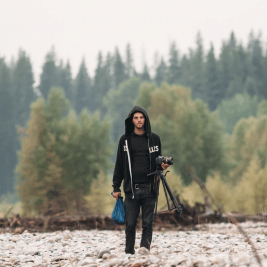
In a piece I wrote way back for the Huffington Post, I tackled the not-quite-trendy-enough topic of greening the big day. In addition to Googling “eco wedding” (which turned up millions of results), I interviewed brides, designers, authors, celebrities, and theknot.com editor (and then grilled my own potential vendors about their environmentally-friendly policies) to find out how we brides and grooms-to-be can easily say “I do”—with a little pizzazz!—to lightening the wedding carbon footprint.
Naturally, my first tip is on picking a venue that is accessible by public transportation. For the full seven ideas on how to start living happily ever after, beginning with your big “green” day, read the story here.
In an era where environmental consciousness is paramount, travelers are increasingly seeking ways to minimize their carbon footprint and contribute to sustainable tourism practices. Fortunately, adopting eco-friendly habits while exploring the world is easier than you might think. Here are seven straightforward methods to green your travel and make a positive impact on the planet:
1. Choose Sustainable Accommodation Options
When planning your trip, opt for eco-conscious accommodations such as eco-lodges, eco-resorts, or hotels with green certifications. These establishments prioritize sustainability initiatives such as energy efficiency, water conservation, waste reduction, and support for local communities. By supporting eco-friendly accommodations, you can minimize your environmental impact while enjoying a comfortable and responsible stay.
2. Reduce Single-Use Plastic Consumption
Single-use plastics pose a significant threat to the environment, particularly in coastal and marine ecosystems. To minimize plastic waste while traveling, invest in reusable alternatives such as stainless steel water bottles, bamboo utensils, and cloth shopping bags. Additionally, choose accommodations and restaurants that offer filtered water stations and refillable amenities to reduce the reliance on disposable plastic bottles and toiletries.
I’d also suggest ditching the old-style invitations that contain lots of plastic, and instead use online wedding invitations like the ones offered by Say I Do, a great Wedding website that offers plenty of digital services to help you make your BIG day as perfect as possible.
3. Opt for Sustainable Transportation
Transportation is a key consideration for eco-conscious travelers. Whenever possible, choose sustainable transportation options such as walking, biking, or using public transit to explore your destination. If driving is necessary, consider renting a fuel-efficient or electric vehicle to minimize carbon emissions. Additionally, support eco-friendly tour operators that prioritize responsible travel practices and minimize environmental impact.
4. Support Local Communities and Businesses
One of the most impactful ways to green your travel is by supporting local communities and businesses. Choose locally owned accommodations, restaurants, and tour operators that prioritize sustainable practices and contribute to the economic development of the region. By investing in local products, crafts, and experiences, you can foster cultural exchange and support the livelihoods of indigenous communities.
5. Practice Responsible Wildlife Tourism
Wildlife tourism can have both positive and negative impacts on animal welfare and conservation efforts. When participating in wildlife experiences, choose reputable operators that adhere to ethical guidelines and prioritize the well-being of animals in their care. Avoid activities that involve captive or exploitative wildlife encounters, such as elephant rides or photo opportunities with wild animals.
6. Minimize Energy Consumption and Waste
Conserve energy and reduce waste during your travels by adopting simple habits such as turning off lights, air conditioning, and electronics when not in use. Opt for accommodations that offer recycling programs and composting facilities to minimize waste generation. Additionally, pack light and avoid excess packaging to reduce the environmental footprint of your belongings.
7. Offset Your Carbon Footprint
Despite your best efforts to travel sustainably, some carbon emissions are unavoidable. Consider offsetting your carbon footprint by investing in certified carbon offset projects that support renewable energy, reforestation, and community development initiatives. Many airlines and travel companies offer carbon offset programs that allow travelers to mitigate the environmental impact of their journeys.
By incorporating these eco-friendly practices into your travel routine, you can minimize your environmental footprint and contribute to the preservation of our planet’s natural beauty for future generations to enjoy. Remember, every small step toward sustainability makes a meaningful difference in creating a more environmentally conscious travel culture.
Eco-friendly photo: Courtesy of Josh Goleman
The co-founder and editor-at-large at offMetro, Lauren is a sustainable travel specialist and freelance journalist with frequent bylines in National Geographic, Bicycling Magazine and Shape. Follow Lauren’s adventures at @laurenmati.










 Sarah Knapp is a Brooklyn based entrepreneur whose love for the outdoors and community building led her to the October 2013 creation of OutdoorFest. She has a BA in History, is a Wilderness First Responder and a NY state hiking, camp and boating guide. Her proudest achievement to date is reading the Aeneid in Latin.
Sarah Knapp is a Brooklyn based entrepreneur whose love for the outdoors and community building led her to the October 2013 creation of OutdoorFest. She has a BA in History, is a Wilderness First Responder and a NY state hiking, camp and boating guide. Her proudest achievement to date is reading the Aeneid in Latin.  Allison was one of our first top writers and Chief Editor but is no longer working with offMetro. Allison is a native New Yorker, who has lived in Rome, Tuscany, Melbourne, Toronto and Los Angeles. She frequently contributed travel pieces to Family Travel Forum, using her own children as guinea pigs as they travel the globe. She never missed a chance to sample local delicacies, as her love for travel goes hand-in-hand with her love for food and wine.
Allison was one of our first top writers and Chief Editor but is no longer working with offMetro. Allison is a native New Yorker, who has lived in Rome, Tuscany, Melbourne, Toronto and Los Angeles. She frequently contributed travel pieces to Family Travel Forum, using her own children as guinea pigs as they travel the globe. She never missed a chance to sample local delicacies, as her love for travel goes hand-in-hand with her love for food and wine.  Josh Laskin is a freelance travel writer and photographer based in the White Mountains of New Hampshire. When he is not at work or on the road, you can find him in the mountains snowboarding, climbing, hiking, fly fishing, mountain biking, and eating bagel bites.
Josh Laskin is a freelance travel writer and photographer based in the White Mountains of New Hampshire. When he is not at work or on the road, you can find him in the mountains snowboarding, climbing, hiking, fly fishing, mountain biking, and eating bagel bites. Annie is a travel writer, environmentalist, and surfer based in Venice, CA. She heads up our West Coast team, keeps our grammatical errors in check, and makes sure our California writers always have a plan for their next adventure. Follow Annie’s travels @annelisemcb.
Annie is a travel writer, environmentalist, and surfer based in Venice, CA. She heads up our West Coast team, keeps our grammatical errors in check, and makes sure our California writers always have a plan for their next adventure. Follow Annie’s travels @annelisemcb. Carly Pifer is a freelance writer who has been known to follow whims inspired by romantic movie scenes or colorful street style shots to India, Japan, Tunisia and Argentina. After stints living in Seoul, Boston, Paris and Los Angeles, writing and searching for something intangible, she landed somewhat steadily in Brooklyn and has begun to find inspiration in her more immediate surroundings.
Carly Pifer is a freelance writer who has been known to follow whims inspired by romantic movie scenes or colorful street style shots to India, Japan, Tunisia and Argentina. After stints living in Seoul, Boston, Paris and Los Angeles, writing and searching for something intangible, she landed somewhat steadily in Brooklyn and has begun to find inspiration in her more immediate surroundings.  Kate E. O’Hara is a New York based freelance writer and photographer who loves all things food—especially the people who make it and market it. Her writing aims to capture the essence of the food experience; the stories that go well beyond a plate of ingredients. In addition to her love of food, Kate is also known to have a hankering for red wine and craft beer. You can also find Kate on Instagram
Kate E. O’Hara is a New York based freelance writer and photographer who loves all things food—especially the people who make it and market it. Her writing aims to capture the essence of the food experience; the stories that go well beyond a plate of ingredients. In addition to her love of food, Kate is also known to have a hankering for red wine and craft beer. You can also find Kate on Instagram